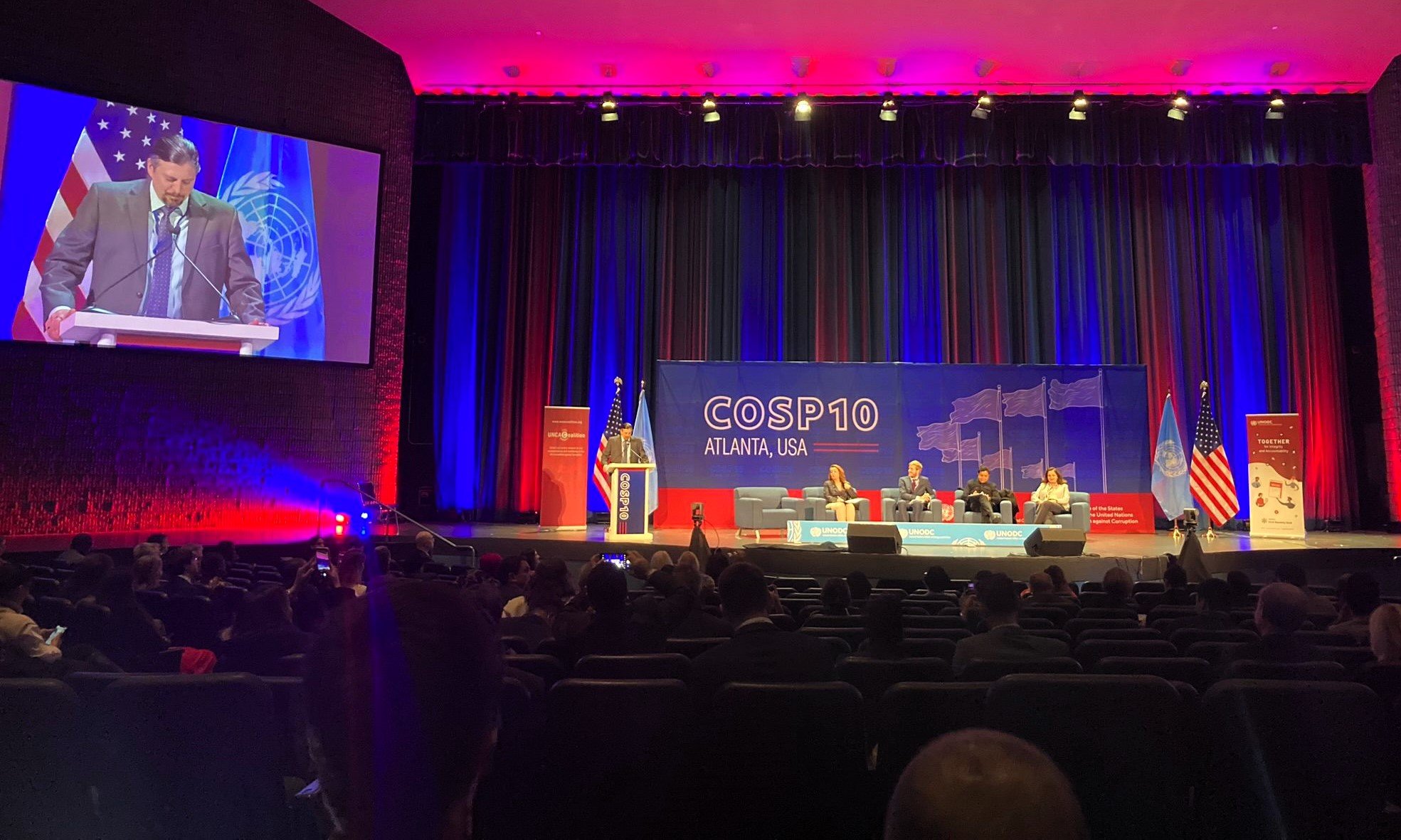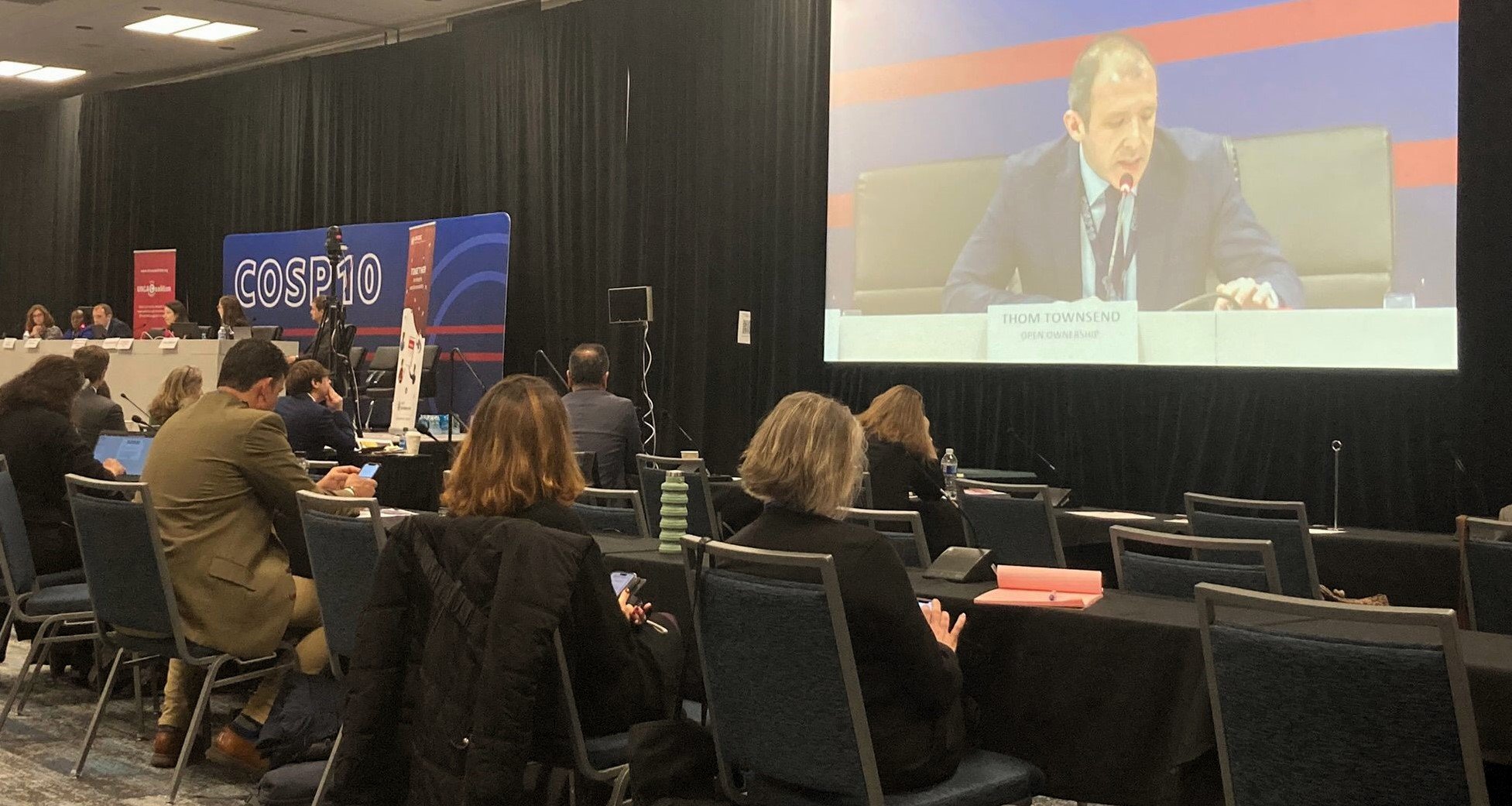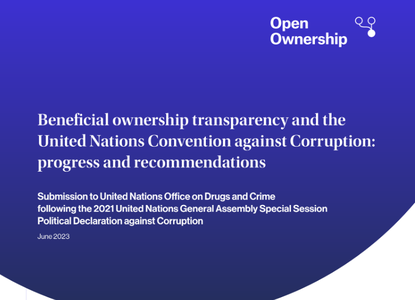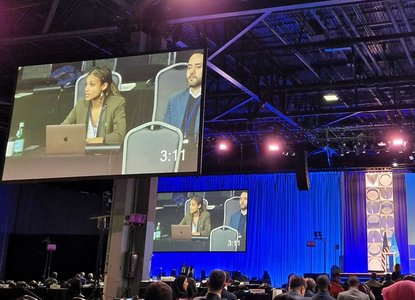Updating international commitments to beneficial ownership transparency at the 10th Conference of States Parties to the UN Convention against Corruption

Richard Nephew, the US Department of State’s Coordinator on Global Anti-Corruption and President of the 10th Session of the Conference of States Parties to the UN Convention against Corruption, speaking in the plenary.
Open Ownership welcomes the new resolution, “Enhancing the use of beneficial ownership information to strengthen asset recovery”, adopted on 15 December 2023 in Atlanta, Georgia, at the 10th Conference of the States Parties (CoSP10) to the United Nations Convention against Corruption (UNCAC). The resolution has not yet been publicly published, so in this second of two post-CoSP10 blog posts, Open Ownership will share our analysis, outline our key takeaways, and explain the additional recommendations that we believe are urgent for international progress on BOT.
The new resolution
Building on resolution 9/7, adopted in 2021, the new 2023 resolution includes additional provisions that reflect some key users’ needs, such as pushing for effective access to beneficial ownership (BO) data that contains historical records and is up to date and searchable.
Open Ownership is encouraged by a provision that provides a unique opportunity for States parties to create concrete initiatives that accelerate global progress with BOT to prevent and detect corruption. The resolution mandates a review of best practices and challenges on BOT to the 2024-25 work plan of the Intergovernmental Working Group on Prevention, and requests that the United Nations Office on Drugs and Crime (UNODC) convenes an intergovernmental meeting with relevant experts.

Open Ownership’s Executive Director, Thom Townsend, was on the panel of a closed-door event for civil society, which enabled coordination of advocacy on resolutions, and key anti-corruption topics at the conference.
Further commitments recommended by Open Ownership
However, stronger commitments that build upon the latest evidence and technological tools are needed to maximise the full potential of BOT as an anti-corruption tool. In fact, in the lead-up to CoSP10 Open Ownership called upon States parties to coordinate international efforts to advance the use of digital and innovative technologies to facilitate the exchange of beneficial ownership information (BOI) transnationally.
To augment this mandate, Open Ownership now calls upon UNODC to enable States parties to promote and adopt international open standards for data. The UNODC and States parties should build upon existing technology solutions, such as the Beneficial Ownership Data Standard, in order to facilitate international exchanges of data. This is critical to the exchange of BOI among all data users who have a role to play in combating corruption. CoSP11 could then review the concrete initiatives of the Working Groups on Asset Recovery and on Prevention, the UNODC, and the widespread implementation of global data standards for BOI, using intelligence gained to create a new resolution for further progress on BOT.
Open Ownership’s key takeaways from the new resolution
Open Ownership is encouraged by several elements in the new resolution. Thanks to the sustained leadership of the Government of Nigeria in chairing negotiations, the inclusion of BOT in the UNCAC resolution sends a strong signal on the importance of this policy area. The resolution also adds several new, welcome elements to the already commendable resolution 9/7 adopted at CoSP9 in 2021.
Many of these elements in the new resolution align with Open Ownership’s recommendations:
- It brings clear alignment with the Financial Action Task Force anti-money laundering global standards by requiring States parties to not only collect adequate and accurate BOI, but to also ensure it is up to date (Paragraph 1). This helps ensure that in all policy areas where BOT adds value there are mechanisms that reflect the latest guidance for implementation. Harmonisation of policy and practice across all policy areas maximises the potential of BOT to counter illicit financial flows.
- It increases focus on user needs by calling upon States parties to implement concrete measures to ensure access to BOI that includes historical records and is searchable by domestic competent authorities (Paragraph 1). Evidence shows that effective access to historical BOI is crucial for investigations as, without this, it is difficult to detect suspicious patterns. States parties should also remove obstacles and challenges that hinder access to and use of BOI by domestic competent authorities. This is an invitation for States parties to assess obstacles and develop innovative solutions to strengthen reforms (Paragraph 15).
- It recognises the role of civil society, the media, and the private sector in anti-corruption efforts and urges States parties to “promote the active participation of actors outside of the public sector” in these efforts (Preamble and Paragraph 8). Civil society, media, and private sector actors play a key role in using BOI to investigate corruption and follow the money.
- It brings a brand-new requirement that urges States parties to facilitate access to BOI by domestic public procurement authorities (Paragraph 9). Public procurement processes are among the top corruption risks for governments and often involve anonymously owned companies. As such, access to BOI by public procurement authorities is essential to preventing and detecting procurement fraud and corruption. This provision is important because the new resolution on public procurement does not explicitly require States parties to facilitate access to BOI by procurement officials, despite civil society recommendations to do so.
- It broadens UN bodies’ mandates by adding a review of best practices and challenges on BOI to the 2024-25 work plan of the Working Group on Prevention and by requesting UNODC to convene an intergovernmental meeting with the participation of relevant experts (Paragraphs 18 and 20). This provides a unique opportunity for continued learning about what is or is not working in BOT implementation. At this meeting, diverse actors would have the opportunity and a dedicated space to create concrete initiatives that accelerate global progress to prevent and detect corruption facilitated by BOT.
Yet, a number of important recommendations raised by civil society, including Open Ownership, were lost in the negotiation process:
- Open Ownership’s experience delivering technical assistance on BOT to 40 countries shows that an inter-agency and transnational solution is required to effectively combat global corruption and financial crime. BOI that is connected transnationally and with other relevant datasets is an essential element to this solution. This enables a broad range of anti-corruption actors in and outside of government to use BOI to better prevent, detect, and combat corruption. Unfortunately, this is missing from the new resolution.
- Free, online, searchable central registers with standardised data that can be efficiently accessed by all relevant actors, including foreign authorities, civil society, and the media were not included in the resolution. Recent surveys of States parties by the UN Secretariat (2023) and by the Intergovernmental Working Group on Asset Recovery (2022-23) show that authorities face major obstacles using current mechanisms for international cooperation as well as in identifying and verifying BOI in an efficient manner. This reduces their ability to prevent, detect, and combat systemic corruption. The surveys emphasised “access to highly interconnected domestic BO registers with accurate information on all types of corporate vehicles” as best practice. A critical mass of BO registers with structured and interoperable data would lay the ground for a powerful inter-agency and transnational solution.
- Investigative journalists, civil society organisations, private data service providers, and academics play a critical role in preventing and detecting patterns of corruption. Open Ownership’s engagement with law enforcement repeatedly shows that they rely on these actors to support their work. Despite this, non-government data users and government data users still face obstacles in accessing and using BOI to effectively counter corruption and crime. Structured data must be collected and made accessible in searchable registers that are designed to meet all users’ needs so that it can be used to make a real difference. The new resolution has not included guidance on structured data.
For more details, see Open Ownership’s CoSP10 recommendations. Open Ownership welcomes those interested in discussing the new BOT resolution to contact Eryn Schornick at [email protected] or Julie Rialet at [email protected].
Related articles and publications
Publication type
Blog post
Country focus
United States of America
Topics
United Nations Convention against Corruption (UNCAC)
Sections
Implementation

